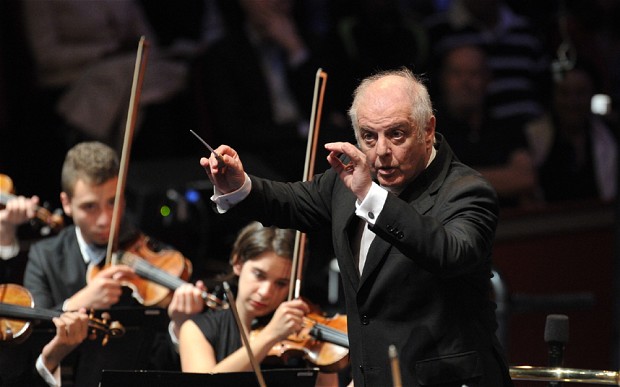Barenboim delivers urgent yet classical Beethoven with West-Eastern Divan Orchestra

Daniel Barenboim conducted the West-Eastern Divan Orchestra Sunday afternoon at Symphony Hall. File photo: Chris Christodoulou
When the West-Eastern Divan Orchestra, led by its co-founder Daniel Barenboim and presented by Celebrity Series of Boston, launched into the Adagio molto introduction to Beethoven’s Second Symphony Sunday afternoon at Symphony Hall, they made it feel as though this was the last symphony in the world.
Where did that sense of urgent attention, that determination to cherish every note, come from? Maybe it was a sense of occasion—giving a program of this composer’s Second and Third Symphonies in a world-famous hall with only one name inscribed on its proscenium: Beethoven.
Maybe it was an awareness that on the day in 1802 when Beethoven inked the double bar at the end of this piece, it really was his “last” symphony, not just the second in a set of nine. That same summer in Heiligenstadt, appalled by his deepening deafness, Beethoven wrote a now-famous letter confessing thoughts of suicide before declaring his resolve to go on.
Maybe it was the existential dilemma that gave birth to this orchestra of mostly Arab and Israeli musicians, founded in 1999 by Barenboim and the late Palestinian-American literary scholar Edward Said with an eye to fostering understanding among the peoples of the Middle East.
The ensemble’s logo is made of musical notation—two bass clefs and a quarter note—arranged to form the outline of a human ear. Statements by Barenboim and others make much of listening as a prelude to understanding. And indeed, the players on Sunday gave the impression of listening intently to each other, as if playing chamber music. No bit of counterpoint or commentary, however fleeting, went unnoticed in the orchestra’s lucid texture.
Even Barenboim seemed at times more listener than conductor, limiting himself to a few encouraging gestures or even dropping his arms entirely. At other times, however, his baton drove the music smartly ahead. He checked in visually with each section of the orchestra in turn, sometimes to cue an important phrase but often just to make contact.
Perhaps it was the “move on” ethos of this whole enterprise that inspired the prevailing brisk (but never rushed-sounding) tempos and the omission of both symphonies’ first-movement repeats. Whatever the reason, Barenboim didn’t wallow in Beethoven’s interesting details, but kept his eye on the distant horizon, pulling the narrative thread tight.
The Second Symphony’s Larghetto, in Barenboim’s version, was much more “etto” than “Largo,” gathering its attractive themes into one smooth flow even while noting the lush lyricism of one and the dancing charm of another.
While keeping the scherzo and finale ticking along right in time, the conductor made the most of Beethoven’s dynamic effects: the abrupt pause, the sudden dynamic “Boo!” and a long crescendo that just grows and grows until one thinks it can’t grow any more, and then grows some more.
If Barenboim’s brisk, attentive approach had the effect of elevating one of Beethoven’s lesser-known symphonies to star status, it had quite a different effect on the Third, rightly celebrated as a world-changing masterpiece. Scrubbed clean of two centuries of commentary, the “Eroica” came across as a striking new work from the Age of Haydn (which, in 1803, it still was).
Instead of looking for signs of Tchaikovsky or Mahler in Beethoven’s score, Barenboim sought the classical logic underlying its enormous expansion of symphonic form and expression. The digressions, outbursts, pauses and elaborations all spoke eloquently for themselves as the conductor kept his eye once again on the distant goal, and the work’s nearly-an-hour duration seemed to pass in a fraction of that.
Pouncing with the two big opening chords before the audience had finished clapping, Barenboim took Beethoven’s marking Allegro con brio literally and delivered a bright, upbeat first movement, enlivened by more of those expressive dynamics and well-gauged climaxes.
The funeral march, whose structure is so loose and episodic that it is often said to represent the disorientation of grief, here began simply, then unfolded as an epic, a heroic life remembered in a series of ever-changing tableaux. The lively yet poised scherzo avoided low comedy; even the horns of the trio were on their best behavior, playing their bounding tune with a nice gleam, but no whooping.
By now one could expect that Barenboim would find the narrative running through the finale’s variations, and he did. The many distinctive contributions by individuals and sections were summed up in the fugue variation, where each section gave its own color and spin to the theme as it entered. Barenboim pulled it all back effectively for the oboe’s tender interlude, then built to the boisterous coda by way of the longest, biggest crescendo of all.
Johann Wolfgang von Goethe’s 1819 poetry collection West-Eastern Divan paid tribute from a German poet to Arabic and Persian literature. On a Sunday afternoon nearly two centuries later, an orchestra born in the Middle East returned the compliment to a German composer—a virtuous circle, if there ever was one.
The next classical-music presentation of Celebrity Series of Boston is Renée Fleming, soprano, and Susan Graham, mezzo-soprano, 3 p.m. Sunday. celebrityseries.org; 617-482-6661.
Posted in Performances





Posted Jan 28, 2013 at 2:29 pm by James
A wonderful performance surpassing my expectations. Congratulations to these talented emissaries of peace.